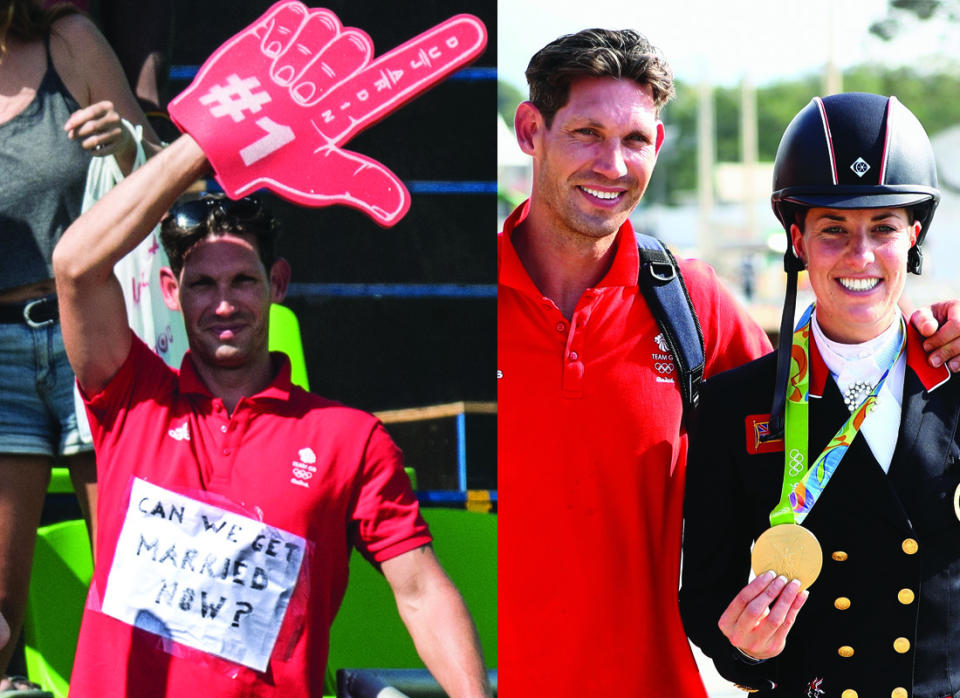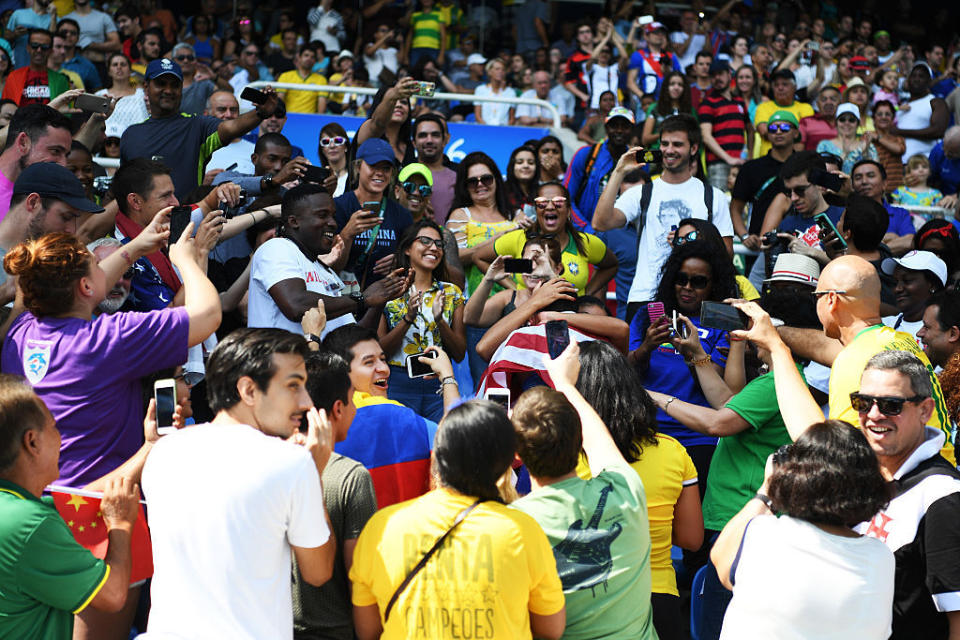An Olympic-Size Debate: The Pros and Cons of Public Proposals

Chinese diver Qin Kai proposed to fellow diver and girlfriend, He Zi, at the Olympics. (Photo: Getty Images)
The Olympics brings out the amateur commentator in all of us: That ball was in! She stuck the landing! His form is flawless! Awwww, love is love! He’s proposing to her NOW? If those last two confuse you, you’ve missed the fact that five Olympic couples have gotten engaged in Rio over the past week and a half (well, one of those couples was technically already engaged). And you’ve missed the alternating reactions of romantics and those who criticized the gestures.
To recap: Brazilian rugby player Isadora Cerullo was walking away from the match that eliminated her team when girlfriend (and stadium manager) Marjorie Enya proposed to her on the field “to show people that love wins,” she told the BBC. We all gushed.

Stadium manager Marjorie Enya, right, proposed to her girlfriend, Brazilian rugby player Isadora Cerullo, left, on the field. (Photo: Getty Images)
After placing sixth in the men’s 20k racewalk, British athlete Tom Bosworth proposed to his boyfriend, Harry Dineley, on Copacabana Beach on Monday — far from the media, until he posted it on Twitter.

British athlete Tom Bosworth, on bended knee, pops the question to boyfriend Harry Dineley in Brazil. (Photo: Twitter)
Another Brit, Charlotte Dujardin, had just finished winning her third Olympic gold in dressage when the cameras caught fiancé Dean Golding wearing a sign on his shirt that read “Can we get married now?” They’ve actually been engaged since the London 2012 Olympics, but “I don’t think he has believed it is going to happen, so now he has gone and made it so public that I definitely have got to do it,” Dujardin told AFP.

After winning the gold, equestrian Charlotte Dujardin’s fiancé Dean Golding, left, wore a sign asking if the couple could move forward on wedding plans now. (Photo: REX Getty)
Right after she received her silver in the 3-meter springboard, also on Monday, Chinese diver He Zi stepped off the podium and was met by boyfriend and fellow diver Qin Kai, who surprised her by getting down on one knee and flashing a ring. The flustered Zi took quite some time before nodding. Then, on Tuesday, American triple-jumper Will Claye leapt straight from his silver medal podium into the stands to pop the question to his girlfriend, hurdler Queen Harrison, who had just missed qualifying this year.

Triple-jumper Will Claye, clad in an American flag, leapt into the stands to propose to girlfriend and hurdler Queen Harrison. (Photo: Getty)
“This morning when I woke up,” Claye told NBC, “I was like, ‘Today’s gonna be the best day of my life.’ I’m going to go out there and do what I have to do on the track first, and then I’m gonna make her my fiancée after that.”
Claye and Enya, in particular, seem to have gotten something right in their approach, at least in public opinion. What makes grand romantic gestures like these seem appropriate?
“When it’s a public proposal, typically it’s in a venue where there’s already a lot of excitement going on, and people are already high and excited, so it can be a way to enhance that excitement and build upon it and then share it with a lot of people all at once,” Jane Greer, PhD, a New York-based marriage and sex therapist and author of What About Me? Stop Selfishness from Ruining Your Relationship, tells Yahoo Style.
Greer surmised that the timing of these proposals might be about something more than just doing it in front of all the cameras. “The people who are training for the Olympics are so single-minded and have been training for so long that once the event is over, there’s such a relief that they can share their energy and concentrate on other parts of their life,” she says.
On the other hand, she agrees with some of the backlash over Qin Kai and He Zi’s engagement, including accusations that he stole her thunder and made the scene all about him.
“When [the proposal] is in a moment in time that is individual and is yours, to have to share it just then compromises the intensity of your own singular experience,” Greer says. “That can oftentimes set the stage for what your relationship is perhaps going to continue to look like over time. It’s going to be a clash of whose needs come first, yours or mine. Because that’s the foundation of marriage. One person is always going to have to balance and jockey their needs in relation to those of their partner.”
In the age of social media, however, Greer doesn’t think the scale or dramatic impact of a proposal necessarily has much to say about the health of the marriage that follows. “The desire to share with a lot of people has sort of become part of our society,” she explains. “It’s not, ‘Look at how narcissistic they are; they have to have this big grand gesture.’ It’s more part of the playing field these days. … It’s not a statement of [whether] your relationship is healthy or not. It’s a statement of how socially active and involved you are, and how important it is to you.”
But what if someone on the receiving end of this type of proposal had really wanted to say “no”? Weren’t they cornered into accepting by the peer pressure of the entire world?
“There’s always a good way to say no that allows for you being able to express what your needs are and where you’re at in a caring, thoughtful way, so you’re not just making the other person feel rejected or hurt,” Greer says. “You can do it playfully. 'I’m saying yes for today; ask me again tomorrow.’ … One would hope that if you’re with somebody who’s going to propose to you publicly, you’re not that out of sync with each other that he’s not putting himself in a stupid position.”
Follow us on Instagram, Facebook, and Pinterest for nonstop inspiration delivered fresh to your feed, every day.


